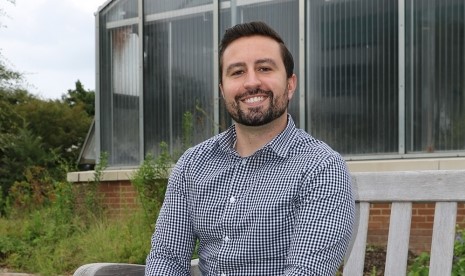
Alumni Spotlight - Mike Litano

Where have you worked since you graduated from ODU?
I've worked at Capital One, as a Principal Associate in the People Analytics department since graduating from ODU.
How did your ODU experience shape where you are today?
A lot of what I do involves the design of experiments, improving the measurement of psychological constructs, and trying to be more rigorous in measurement and evaluation. ODU has very rigorous statistics courses, which have helped me succeed in those tasks. At ODU, we also have many opportunities to apply what we've learned to real life projects, whether it's grant-related work or client-facing consulting. So, you really develop the leadership skills you need to be successful, and you learn how to apply them - leading analytical projects and influencing stakeholders with the analyses that you conduct. Having those experiences really allowed me to tell better stories when I started working, which is really important. That's what people really care about. You can run whatever complex analyses you want, but no one is going to listen or value what you are saying if you can't tell an easy-to-understand and applicable story about why it's important. Having those types of experiences, including ownership of projects and having the trust of faculty members, really played an instrumental role in my confidence and ability. Ultimately, I would say the strong quantitative background that I gained from class and having the opportunity to apply all of those skills alongside our esteemed and talented faculty was really critical to my success.
What was the most beneficial thing that you did as a student at ODU to prepare you for post-graduation?
There's a few things that come to mind here. First ODU has a broad variety of courses that set you up with a really strong foundation - we have exceptionally strong courses in statistics and experimental design. The content classes are all extremely important, too, but you'd be surprised how many non-I/Os in the working world know just as much as you do about leadership and motivation theories, organizational design and culture, and performance management. It's the combination of those two areas that (in my opinion) differentiates I/O Psych PhDs from everyone else. Some of the most important experiences that I had include applying what I learned in those content courses to real problems and using the quantitative courses to design an experiment and evaluate a solution.
Having a real internship experience was also extremely helpful for my post-grad life. My 18-month internship at NASA not only permitted me to experience everything that I was reading and learning in real-life situations, but it was also really nice to be able fail and fall flat on my face in a safe environment. My time at NASA helped me learn how to tell a story and that I should never use terms like R2 or reliability without considering who my audience is.
In addition, Dr. Debra Major, my advisor, had many federally-funded grant opportunities for me to work and collaborate on, and being able to take a leadership role on such large-scale projects for multiple years helped prepare me to do the same in my current role. Collaborating with other faculty members on publications also helped prepare me. I worked with Dr. Richard Landers on a meta-analysis that ended up being accepted for publication in a pretty good journal. I had never worked on a meta-analysis outside of a formal class setting, and he treated me like a colleague and trusted me to take the lead, which really helped build my confidence.
To summarize the longest answer ever, I would say it's about being able to take what you've learned in class and apply it, whether it be in an internship, grant work, or working on a publication - all this in addition to your thesis or dissertation. If you only focus on those milestones, you're missing out on a lot of development opportunities. You're likely never going to write a 200 page paper again, but you will be presented with a lot of ambiguous challenges where you have to be able to apply things that aren't in the textbook and communicate it effectively to any audience.
What is your favorite memory from graduate school at ODU?
I would say my favorite memory is my first publication acceptance. I didn't go into an academic career and although I considered it, I never fully planned to, but I remember the rush that I got when my first journal article was accepted. I was a second author, but it was something that made me feel like I belonged in graduate school and that I could really be an I/O Psychologist. For my entire first year of grad school I had imposter syndrome. I was getting fine grades in class, but faculty emphasized how important mastery learning is - that grades don't really matter if you don't really know the material. I wasn't confident that I knew enough and was working every day of the week, so receiving that first publication acceptance was such a confidence-builder and an intrinsically motivating reward for me. It changed my mentality as a grad student to: "I can do this." From my first day, Dr. Major said, "Hey, don't treat me like I'm your boss or superior. I want you to treat me like a colleague and review my work as much as I'm reviewing your work." That seemed silly to me because I felt like I didn't know anything, but that first publication was at least evidence to me that I knew something. At first, I was definitely driven to publish because of ODU's publication route for doctoral candidacy, but even after I qualified for that option I continued to publish because it made me feel good. I really enjoyed it. I enjoyed when somebody would ask me about my paper via email. It was a great use of time - my publications helped me establish myself as an expert in certain areas both at NASA and Capital One.
What is the single most important piece of career advice that you can give someone in your field?
Every single thing that you learn, try to be able to explain what it is and why it is important to your mom (unless your mom is also an I-O Psychologist). It doesn't matter how much you know if you can't explain it's value to the person who needs to say 'yes.' If you can take complex concepts and methods that few others know much about and you can explain them very simply in layman's terms, you'll be very effective in the business world.
Interview conducted by Seterra Burleson and Elena Auer